|
|
|
|
|
|
|
|
|
|
|
|
|
|
|
|
|
|
|
|
|
|
|
|
|
|
|
|
|
|
|
|
|
|
|
|
|
|
|
|
|
|
|
|
|
|
|
|
|
|
|
|
THE JIM SHOOTER AVENGERS
INTERVIEW (Page 1 of 4)
|
|
|
|
|
|
--A WONDER MAN: COOLER THAN SUPERMAN
EXCLUSIVE--
|
|
|
|
|
|
|
|
|
|
|
|
|
|
INTERVIEWER: MITCHEL
|
|
|
|
|
|
|
|
|
|
|
|
|
Editor
in chief of MARVEL COMICS for almost a decade: JIM SHOOTER. Jim was perhaps
one of the youngest talents to ever start writing comics professionally. At
age thirteen he was writing Superman, Superboy and Legion of Superheroes for
DC. Two years after he moved to Marvel he was made editor in chief. In those
two years previous to his promotion and then while still being the editor in
chief he wrote some of the most amazing tales ever to grace the pages of THE
AVENGERS and planted ideas in the book who redefined old established characters
like Hank Pym, the Wasp, Vision and Scarlet Witch. But most important to this
site, it was Jim Shooter the guy who inherited the character of WONDER MAN for
the first time since that classic Lee/Kirby story that introduced him. Jim Shooter,
previous Superman writer, gave us an all too human born in the USA Superman
in the figure of Wonder Man. After many failed attempts I was finally able to
track him down and interview him: |
|
|
|
|
|
|
|
|
|
|
|
|
|
|
|
|
|
|
|
|
|
|
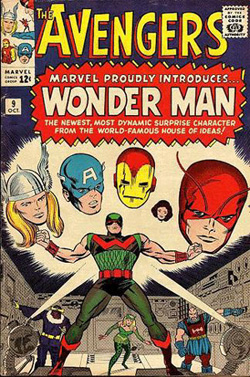 |
|
|
|
|
|
|
1-There has been much talk in Avengers message boards
between fans about what prompted Marvel to bring back Wonder Man from the
dead back to the pages of the Avengers after being a character that was left
dead for such a long time. In a recent Alter Ego article (#13) an old interview
with Stan Lee from 1965 by the guys from a fanzine called CRUSADER reveals
this:
|
|
|
|
|
|
|
|
|
|
Editor:
"Why did you 'kill off' Wonder Man (who appears in The Avengers)?"
Stan:: "Well, that is a very interesting story. We were intending to bring
him back, but we found that DC had a story about a year ago, concerning a robot
named Wonder Man. I myself never saw or heard [of] him. The head of National
Comics wrote to us and informed us of the fact that he had already used the
name Wonder Man. We do not want to use anyone else's name, so only for that
reason, we are not bringing Wonder Man back. And besides, we can't, because
we don't copy anyone."
So it seems the whole Wonder Woman connection is just
old rumor. Did you ever have any talk with Stan Lee about Wonder Man that may
confirm or negate this statement? You were there when it finally happened and
you were a part of the creative team that wrote Avengers 151, your first Avengers
issue. Could you describe what's the inside story behind Wonder Man's return? |
|
|
|
|
|
|
|
|
|
|
|
|
|
|
|
|
|
|
|
|
|
|
|
I
think that Stan was being circumspect. Around the time of Gerry Conway’s
brief return to Marvel, DC introduced Power Girl. Since we had a character named
Power Man, of course, that brought up the subject of the Wonder Man situation.
The story I heard at the time from Stan and others was that, in the early sixties,
DC had objected to Wonder Man because of Wonder Woman, and had threatened legal
action if Marvel didn’t cease and desist using the word “Wonder”
in character names. Wonder Woman is, and was, one of DC’s top several licensing
properties (though the book never sold very well), and it makes sense that DC
would fight to defend the “Wonder” franchise. The notion that their
objection was based on a throwaway robot character is absurd, frankly. |
|
|
|
|
|
|
|
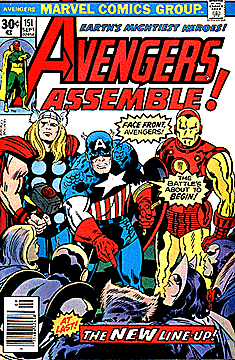 |
|
|
|
|
|
|
|
|
|
|
|
|
|
|
|
|
You
have to consider these events in the context of their respective times. During
most of the sixties, DC’s parent, National Periodical Publications, was
Marvel’s distributor (!) through their Independent News subsidiary. Marvel
was, in some ways, under their thumb. By the time Gerry |
|
|
|
|
|
|
|
|
|
|
|
|
|
|
|
|
|
|
|
|
|
|
|
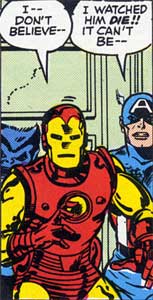 |
|
|
|
|
|
|
|
reintroduced
Wonder Man, more or less in response to Power Girl, Marvel comics were being
distributed by Curtis Circulation, a subsidiary of Marvel’s parent, Cadence
Industries, and Marvel was less vulnerable. Also, the relationship between the
two companies had changed somewhat. During the sixties, there was a real B-to-B
enmity. (I worked at DC from 1965 to 1969, by the way.) During the early-to-mid
seventies, things had mellowed out some. A lot of creative types were shuttling
between the two companies-verboten during the sixties, hence the many pseudonyms
used in that era-the DC guys hung out at the Marvel offices after hours and
we all played volleyball together in Central Park. The business people/big shot
execs at both companies had |
|
|
|
|
|
|
|
|
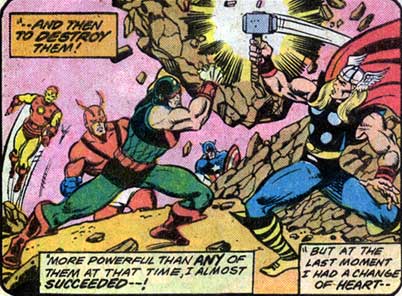 |
|
|
|
|
|
|
|
|
|
|
|
|
|
|
|
|
|
|
|
|
|
|
|
|
|
|
|
|
become
more removed from what was happening in the comics. Marvel’s president,
Jim Galton, for instance, was once asked in my presence to name six Marvel characters
and couldn’t do it! DC’s big shots-except for Paul Levitz, who remember,
was/is also a creative guy-were similarly out of touch. So, we creative types
got away with stuff that never would have flown in the Mort Weisinger/Martin
Goodman days. |
|
|
|
|
|
|
|
|
By
the way, my first issue of Avengers was actually # 150. Steve was routinely
MONTHS late with his work, and therefore, many issues of the Avengers and other
Englehart books were reprints or fill- |
|
|
|
|
|
|
|
ins.
Steve was so late with the script to issue #150 that Gerry asked me to write
the dialogue for the issue overnight. (Marvel style, as most fans know, requires
the penciler to draw the visuals from a plot synopsis. The writer then writes
dialogue to go with the pictures.) I stayed up all night and wrote the dialogue.
A couple of days later, Steve’s dialogue finally arrived, and to keep Steve
from quitting, his, not mine, saw print. In my opinion, mine was better, though
I was winging it without even a copy of the plot. I think Steve, who was on
his way to other things, like writing novels, was phoning it in at that point.
Soon thereafter, Steve quit Marvel, and stayed gone till years later when I,
as Editor In Chief, hired him back. |
|
|
|
|
|
|
|
|
|
|
|
|
|
|
|
|
|
|
|
|
|
|
|
|
|
|
|
|
2-At
that time, after a short stint by Gerry Conway who reintroduced Wonder Man you
inherited the title from long time scribe Steve Englehart and set out to create
together with George Pérez some of the most memorable Avengers sagas
in history. How did you approach the Avengers? What was different from your
other work? |
|
|
|
|
|
|
|
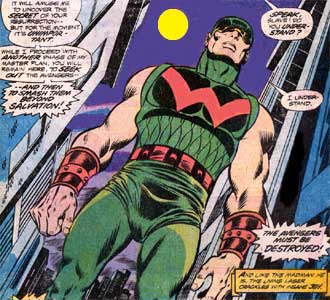 |
|
|
|
|
|
|
|
|
|
|
I
thought of the Avengers as the All-Stars. I tried to focus on the classic characters,
the ones who were stars of their own titles, and live up to the legend “Earth’s
Mightiest Heroes.” Other writers, I think, found it easier to use and focus
on characters that didn’t appear elsewhere, thereby avoiding continuity
problems. I thought the continuity weave was part of the point. I did use characters
like Tigra and, more to the point, Wonder Man, because I felt it was good to
|
|
|
|
|
|
|
have
characters to contrast and challenge the established stars, but I wanted to
make sure that the readers were getting the cream of the Marvel pantheon, and
not just the characters that were more convenient for me. |
|
|
|
|
|
3-This
Wonder Man had a presence. In one of his first battles by Gerry Conway he takes
charge, KO the Sub-mariner, then asks questions. He also starts claiming his
fists hit as strong as Thor's hammer. This is a huge claim since Thor is the
strongest team member and his hammer hits stronger than his fists. Up to the
reintroduction of Wonder Man, Thor had been my favorite character. I wasn't
even in high school when you started writing Avengers and I collected Avengers
because Thor was part of the team. You made Wonder Man my favorite character.
Forget about Thor, this guy had attitude, he wasn't a god or an alien, just
a regular Joe from New Jersey |
|
|
|
|
|
|
|
|
|
|
|
|
|
|
|
|
|
|
|
|
|
|
|
|
|
|
|
|
|
|
|
|
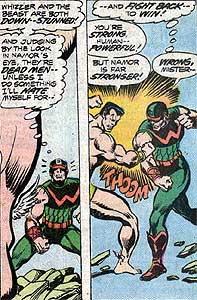 |
|
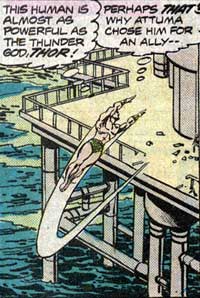 |
|
|
|
|
|
|
|
who
could hit harder than Thor! WOW! I think you were creating wrestler "the
Rock" back then. And that fight with the Vision was simply awesome, a guy
that can resist an intangible hand thru his chest and all the arsenal of powers
that the Vision has, had to be special! I think seeing him going against other
heroes like the Sub-mariner and Vision and finishing on top was part of the
instant appeal of this character. What was the creative process when fleshing
out and re-creating this long dead character? |
|
|
|
|
|
|
|
|
|
|
|
|
|
|
|
|
|
|
|
|
|
|
|
|
|
|
|
|
|
|
|
|
|
|
|
|
|
I
spend a great deal of time trying to get into a character’s head, “role
playing” the character, if you will. Wonder Man presented an interesting
dichotomy. He was obviously a tough, smart guy, imbued with immense power. He
understood his power, and knew he was at the top of the scale, comparable, if
not superior, to the likes of Thor, the Sub-Mariner and the Hulk-hence his assertiveness
and boldness from the get-go, in many situations. But, no matter how |
|
|
|
|
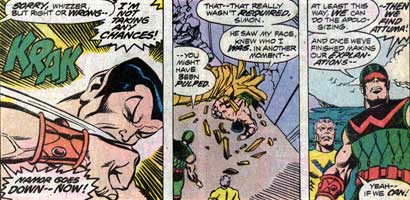 |
|
|
|
|
powerful
you are, it’s got to freak you out the first time you’re face-to-face
with Ultron. Wonder Man had no experience that would prepare him for that. Therefore,
the strongest and hardest-to-hurt man in the world hung back while Cap (who
isn’t daunted by anything) stepped forward to face Ultron. |
|
|
|
|
4-Wonder
Man was a new/old character, a Lee/Kirby creation from a solid story that have
had tremendous ramifications in the Avengers title. I mean, Simon Williams had
been almost a member from the title's very beginnings, he had died but his brain
architecture had been living for years (actually real publishing years, not
just |
|
|
|
|
|
Marvel
years) as an Avenger in the form of the group's resident android: The Vision.
Englehart built, thru his extensive tenure as writer, a romantic and complex
relationship between Vision and the Scarlet Witch and suddenly you started to
use the return of this character as a means to start shaking things up. The
first thing you did was to establish an attraction between Simon Williams and
the Scarlet Witch that many writers after |
|
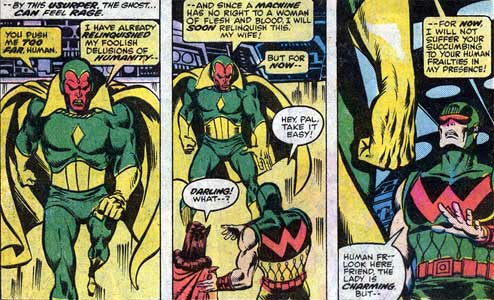 |
|
|
|
|
|
|
|
|
|
|
|
|
|
|
|
|
|
|
|
|
|
|
|
|
|
|
|
|
|
|
|
|
|
|
|
|
|
you
have wanted to play with. Particularly John Byrne and Kurt Busiek. You seemed
to have ended it with the Scarlet Witch being very ladylike and even though
clearly attracted to Williams behave like a dutiful faithful wife and Simon
act very chivalrous and control his raging hormones and try to look in another
direction. What are your thoughts on these three characters, the way you played
them and the way other writers have played them? |
|
|
|
|
|
|
|
|
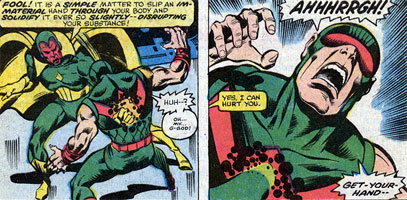 |
|
|
|
|
|
|
|
|
|
|
|
|
I
think you said it. Too many times in comics, the characters stumble into every
pitfall offered. I wanted, for once, to have a tension unrelieved, a lust and
love unrequited, a chance for dishonor disdained. I thought of Simon Williams
as a man of honor. |
|
|
|
|
|
|
|
|
|
|
|
|
|
|
|
|
|
|
|
|
|
|
|
|
|
|
|
|
|
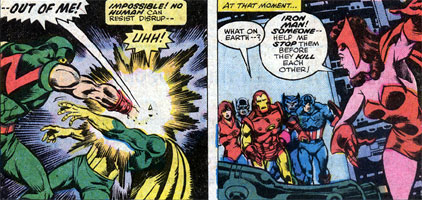 |
|
|
|
|
|
|
|
|
5-The
Trial was one of my favorite stories from your run. It is the best example that
you don’t need to have Thor, Iron Man or |
|
|
|
|
|
|
|
|
|
|
|
|
|
|
|
|
|
|
Captain
America in order to create a memorable Avengers story. In here you finally bring
long Avengers foe and Simon Williams brother the Grim Reaper into the equation.
Thru this story we see Vision discover that he is not Simon Williams and accept
himself as his own man, Wanda reaffirms her love for the Vision and Simon confronts
part of his past. Even though not much had been revealed from all these characters
yet, their pasts, their childhood's, parents etc. you presented believable three
dimensional characters and the soap opera was as interesting as the action.
Is this one of |
|
|
|
|
|
|
|
|
|
|
|
|
|
|
|
|
|
|
|
|
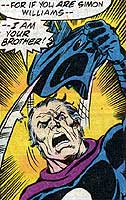 |
|
|
|
|
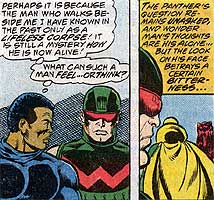 |
|
|
|
|
|
|
|
your
favorite stories? How do you feel about other writers particularly Englehart's
later take on this "family", the later introduction of Mrs. Williams
and revelations about Sanford Williams as an abusive father in West Coast Avengers
and Vision and Scarlet Witch LS? |
|
|
|
|
|
|
“The
Trial” was one of my better efforts, I think. I don’t remember much
about the later stories you cite. |
|
|
|
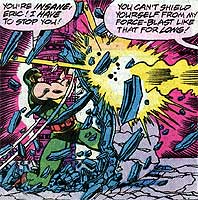 |
|
|
|
|
|
|
6-From
this story and later treatment of the character of Wonder Man by David Michelinie
I started to suspect that Simon Williams was innocent from the embezzlement
charges in Avengers #9 and that he had taken the blame from his brother the
Grim Reaper. Michelinie said in an interview for this site that to him Simon
was innocent. Was he innocent to you as well? Was that your intention, to eventually
reveal he was innocent? What do you think of Englehart making him publicly admit
he was guilty during his WCA tenure as writer? |
|
|
|
|
|
|
|
|
|
|
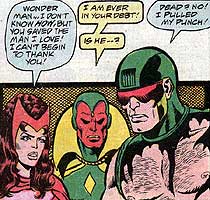 |
|
|
|
|
|
|
|
|
|
|
|
|
|
|
|
|
|
|
|
|
|
|
|
|
|
|
|
|
|
|
|
|
|
|
|
|
|
I
never thought that Simon Williams actually did anything wrong. In my mind, he
was shafted, ruined, and bitter over it for a while, but his later behavior
suggested that he was fundamentally an honest man. I didn’t read the Englehart
stories you’re referring to, but from what you indicate, I don’t think
I agree with Steve’s take. |
|
|
|
|
|
|
|
|
|
|
|
7-Another
thing you established was a special friendship between the Beast & Wonder
Man that later Michelinie infused with even more memorable funny situations
and humor. What made you pair up those two? What do you think of Michelinie's
work with them? Do you think they could be written in an ongoing series ala
Power Man and Iron Fist? |
|
|
|
|
|
|
|
|
|
|
|
|
|
|
|
|
|
|
|
|
|
|
|
|
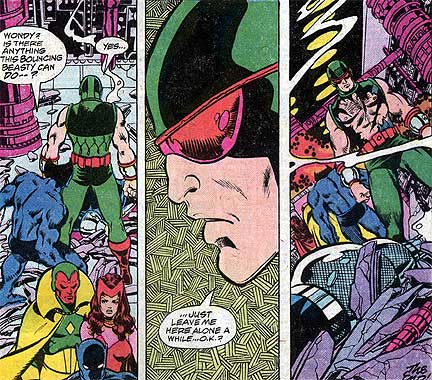 |
|
|
|
|
|
|
|
|
I
thought a comedian like the Beast would naturally gravitate to a classic straight
man like Simon Williams, and vice versa. They’re also both bright and intellectual.
I had fun playing them off against each other. David Michelinie did great stuff
with them, things I would never think of. He’s amazing with that kind of
character interplay. Sure, they could co-star in a series, if you had a Michelinie
or his clone writing it. |
|
|
|
|
|
|
|
|
|
|
|
|
|
|
|
|
|
|
|
|
|
|
|
 |
 |
 |
 |
 |
 |
 |
 |
 |
 |
 |
 |
 |
 |
 |
 |
 |
 |
 |
 |
 |
 |
 |
 |
 |
 |
 |
 |
 |
 |
 |
 |
 |
 |
 |
 |
 |
 |
 |
 |
 |
 |
 |
 |
 |
 |
 |
 |
 |
 |
 |















